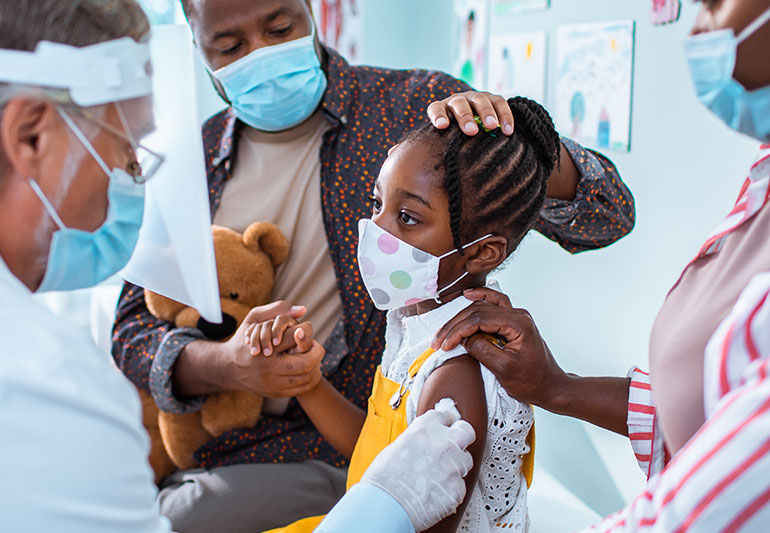All students in MCPS should have access to the vaccine
Photo courtesy of Cleveland Clinic.
Clinical vaccine trials for children took place back in fall of 2021. After the FDAs approval of child vaccinations, children in the 5-11 year old age group have been getting vaccinated.
March 17, 2022
Should children get the COVID-19 vaccine? Is it safe? Are they too young to get vaccinated? These are all questions that doctors, parents and children themselves have raised across the country. But the real question is: should kids be able to decide for themselves whether or not the vaccine is right for them?
The COVID-19 pandemic is about to hit the two-year mark, and one of the ways to effectively end it, is to get as many people vaccinated as possible. The 5 to 11-year-old age group was previously the largest group of people in the United States not yet eligible for the jab, and they continue to account for a significant portion of new COVID-19 cases. This means that getting the children vaccinated could possibly be a game-changer for this country.
In Alabama, according to kff.org, minors above the age of 14 do not need parental consent to receive the COVID-19 vaccine. Similarly, parental consent is not required for minors in states such as Oregon, South Carolina, South Dakota and even the District of Columbia — although the required ages do vary. In a few states such as Arkansas and Idaho, providers of the vaccine are permitted to waive parental consent. However, 42 states, with the exception of a few cities like San Francisco and Philadelphia, still require consent for the vaccine for all minors.
It is true that it is the precedent for all vaccines, especially optional vaccines such as the flu shot, to be administered under parental supervision. Some people may also say that it is unethical and unorthodox for a vaccine to be administered without standard parental consent because young kids should not be able to hold that type of responsibility. However, when talking about the vaccine for COVID-19, the urgency of this endless pandemic creates a situation where kids should actually be able to override their parents’ decisions to make their own informed choice.
Additionally, for those who doubt the safety of the vaccine for young people, data from the fall of 2021 has already concluded that the vaccine proves to be safe for children. The FDA advisory panel voted in favor of approval on the basis of this clinical-trial data showing that the Pfizer–BioNTech vaccine is approximately 91 percent effective at preventing “symptomatic SARS-CoV-2 infection” in 5-year-olds to 11-year olds (kff.org).
Elementary schools all over the world are trying to push through this pandemic and make the most of the experience for young students. Despite COVID-19, counties have been able to open schools. Vaccines are helping schools stay open by preventing the rapid spread of COVID-19; vaccines have been imperative tools in the fight against serious sickness, hospitalization and death that are allowing students, staff and parents to continue to operate.
If we can get as many children as possible vaccinated against this virus, it will undoubtedly have a positive impact on the state of the pandemic in the U.S. No political viewpoint or general biases should prevent kids from getting the potentially life-saving shot against COVID-19. It is vital for the future of the United States that people, starting right here in Montgomery County, Md., start advocating for looser requirements on parental consent for child vaccinations.



